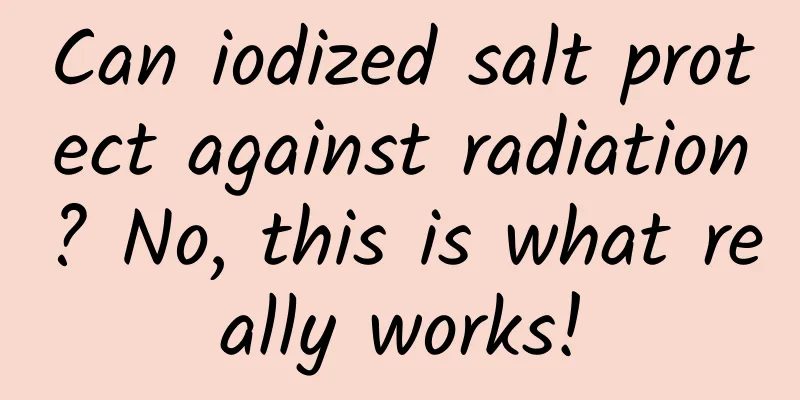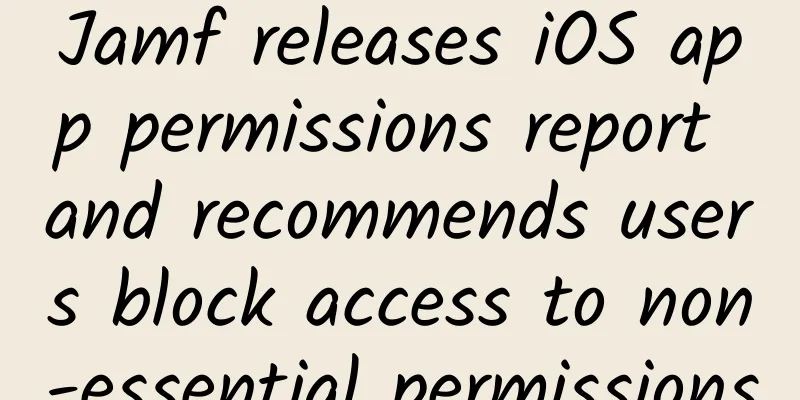Can iodized salt protect against radiation? No, this is what really works!

|
Recently, Japan's Fukushima Daiichi Nuclear Power Plant started discharging contaminated water into the sea. These contaminated waters may contain radioactive substances such as cesium, strontium, radioactive iodine, cobalt, and radium, which will cause serious pollution to marine life and the ecological environment, and pose a serious threat to human health. There are rumors that eating iodized salt can prevent radiation from radioactive substances, which has led to a hot sale of iodized salt in some parts of the country. So, can iodized salt really prevent radiation? What are the iodine-containing drugs that can reduce the harm of radiation to the human body? Why can't iodized salt protect against radiation? On January 27, 2023, the World Health Organization updated the "National Stockpiles for Radiological and Nuclear Emergencies: Policy Recommendations" on its official website, which included a list of medicines recommended for stockpiling in response to radiological and nuclear emergencies. According to this list, a typical radiation emergency stockpile includes the following medications: Stable iodine (potassium iodide): blocks or reduces the absorption of radioactive iodine by the thyroid gland; Prussian blue: removes radioactive cesium (Cs) and thallium (Tl) from the human body; Cytokines that alleviate bone marrow damage: used in cases of acute radiation syndrome (ARS); Other medicines to treat vomiting, diarrhea, and infections. Why does WHO recommend stockpiling stable iodine (potassium iodide)? Because after a nuclear explosion, a large amount of radioactive materials will float around, among which there is a deadly substance called iodine-131. Iodine-131 can not only float in the air, but also flow into the sea, polluting seawater and marine life. Radioactive iodine-131 enters the human body through breathing and eating, and will be deposited in the thyroid gland, causing thyroid cancer. Taking stable iodine can saturate the iodine absorbed by the thyroid gland, prevent the absorption of radioactive iodine, and thus reduce the risk of thyroid cancer. If stable iodine is taken 6 hours before inhaling radioactive iodine, the effect of blocking the deposition of radioactive iodine in the thyroid gland can reach 100%; taking stable iodine at the same time as inhaling radioactive iodine can block 90% of the deposition of radioactive iodine in the thyroid gland; taking stable iodine within 6 hours of inhaling radioactive iodine can still reduce the amount of radioactive iodine absorbed by the thyroid gland by about half. That is, stable iodine (usually potassium iodide tablets), as a thyroid radioactive iodine inhalation blocker, can prevent the intake of radioactive iodine. Therefore, the use of potassium iodide tablets is considered an appropriate strategy to reduce the risk of thyroid cancer in the population due to accidental release of radioactive iodine. However, potassium iodide tablets are not "radiation antidotes". They can only prevent the deposition of radioactive iodine in the thyroid gland, but cannot prevent the harm caused by other radioactive substances. And consuming iodized salt to prevent radiation is even more unreliable. In my country, 1 kg of iodized salt contains about 20 to 30 mg of iodine, and to prevent radiation, you need to consume 100 mg of iodine, which means that the iodine content of more than 3 kg of iodized salt can reach this number. The recommended daily intake of salt for the human body is about 5 grams. If you consume 3 kg of salt, you will already have electrolyte imbalance before you can prevent radiation! Which type of potassium iodide can be used for radiation protection? Potassium iodide tablets are divided into two categories: medicinal use and nuclear emergency use. They are very different in terms of dosage, usage, indications, etc. Therefore, only 130 mg/tablet potassium iodide tablets for nuclear emergency use can be used for radiation protection, and ordinary medicinal potassium iodide tablets do not have this indication. The recommended dose of potassium iodide tablets for radiation protection depends on age. One dose is usually enough! Because the human body can only accommodate a certain amount of iodine, excessive use will increase adverse reactions. The number of days of use should be determined based on the local radioactive iodine exposure time. Repeated use may be required in cases of long-term (>24 hours) or repeated exposure, unavoidable intake of contaminated food and drinking water, and poor nuclear contamination evacuation conditions. Potassium iodide tablets for nuclear emergency use have many adverse reactions and contraindications, so they should not be taken blindly! Adverse reactions include salivary gland swelling, nausea, vomiting, diarrhea, stomach pain, fever, headache, metallic taste and allergic reactions. People who have been allergic to iodine, as well as a few rare pre-existing immune diseases (herpetiform dermatitis or low complementary anemia vasculitis), nodular thyroid disease with heart disease are prohibited from using it. |
<<: New secret of the earth's center: Is there an "inner core" hidden deep inside the earth?
>>: If you want to pet giant pandas, where else can you go besides the zoo?
Recommend
Future Computing Atlas: What will computing look like in ten years?
Amid the turmoil of the global economic downturn ...
How to achieve high conversion rate in WeChat public account advertising
In the market segments of various advertising cha...
Are the “viruses” produced by RNA vaccines harmful to the body?
Review expert: Gu Haitong, deputy chief physician...
Can Microsoft make a comeback with the Surface Phone?
No matter how good the overall environment is, eve...
Skipping breakfast makes you more likely to gain weight. Why is this happening?
When managing their weight, some people specifica...
Juliang Qianchuan 20 Qianchuan delivery experience
Douyin e-commerce's delivery tools have evolv...
When Science Meets Doubt: The "Unbreakable Glass" of 1970
Glass is one of the most fascinating materials in...
Star Chaser | From snow-capped mountains, deserts, fluorescent seas to city landmarks, the sun, moon, and stars in my eyes
It took me five years to select 50 clips from mor...
A look at the tech products and services that disappeared in 2015
[[161053]] 1. Amazon Fire Phone Amazon's Fire...
What should we pay attention to when placing the Wenchang Tower?
1. Introduction to Wenchang Tower Wenchang Pagoda...
Academician You Zheng: Breakthrough in high-end sensor technology to build a solid foundation for a strong country in science and technology
As the source of information acquisition, sensors...
Search bidding planning budget strategy!
In actual search bidding, you will often encounte...
Why do Android phones get slower and slower with 6G memory?
Nowadays, mobile phones have 3 to 4G memory and th...
The inspiration for the "underground dragon" shield machine actually comes from a mollusk
Produced by: Science Popularization China Author:...
Really lengthened. Spy photos of the domestically produced new Audi Q5 body in white
Earlier media reports said that the new FAW-Volks...









